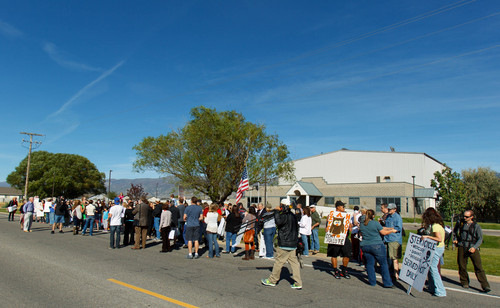This is an archived article that was published on sltrib.com in 2013, and information in the article may be outdated. It is provided only for personal research purposes and may not be reprinted.
After years of wrangling, new headquarters for the Salt Lake County district attorney's office are now set to be built adjacent to — appropriately enough — the Courthouse TRAX Station.
County Mayor Ben McAdams said Tuesday the county bought a 3.1-acre parcel on the northeast corner of 500 South and Main Street from Property Reserve, Inc. (PRI), the real-estate arm of The Church of Jesus Christ of Latter-day Saints. The sales contract put the price at $9.1 million.
Currently a parking lot, the new site puts prosecutors right next door to 3rd District Court in the Matheson Courthouse, saving them the block-long walk past Grand America Hotel from what had been proposed as the D.A. office site — the southwest corner of 600 South and State Street.
But that 2.3-acre site did not have enough parking, which would have cost more to buy or rent. The five-story building designed for that site also caused widespread heartburn among many County Council members, who balked at its price (one projection reached $50.8 million, up from an initially envisioned $33 million) or the administration's goal of making it the most environmentally efficient building possible.
So after lengthy closed-door discussions, which also included a commitment to develop future district attorney's offices on county-owned land in West Jordan, the council supported McAdams' purchase of the new site.
"We know that owning the building is more cost-effective for county taxpayers than leasing office space," McAdams said, noting that prosecutors will be "steps away from where they do most of their work — the courthouse."
The cost of the new building remains to be determined. McAdams projected that owning the D.A.'s offices will save the county $13 million over the first 30 years of the building's operations. The county now pays $1.45 million to rent three locations, said County District Attorney Sim Gill, who was elated the project is moving forward again.
"This is singularly the best site available for our purposes," said Gill, noting the idea of a district attorney's office surfaced almost 20 years ago, seriously since the council issued a $33 million bond for the project in 2010.
Council Chairman Steve DeBry said he dropped his longtime resistance to focusing on a downtown site because the D.A. and mayor confirmed to him that West Jordan would become an important second hub for prosecutor offices as the county's population center shifts to the south and west.
McAdams said revenue from sale of the State Street land will help defray the cost of the Main Street purchase. He also believes the new building's proximity to both state and federal courts will entice state agencies, including the Utah attorney general's office, to share space and participate financially in the project.
While financing is figured out, attention also will turn to designing the building. That has been a contentious point in the past. Opinions differ about how environmentally advanced it should be.
Twitter: @sltribmikeg The final wording wasn't as tough as Councilman Sam Granato sought, but the Salt Lake County Council will ask Gov. Gary Herbert to keep close tabs on the state's investigation of alleged air-pollution violations by the Stericycle medical waste incinerator in North Salt Lake.
Stopping short of advising the governor to shut down the facility, the council unanimously endorsed wording asking him to "consider ordering the cessation of harmful emissions from Stericycle" as the state Department of Environmental Quality's investigation of allegedly excessive releases of toxic pollutants unfolds.
DEQ inspectors cited Stericycle earlier this year for violating emissions limits on nitrogen oxide, dioxins and other hazardous pollutants released from its incinerator and of tampering with results. The Illinois-based company said last week it was contesting the charges.
Although the facility is outside of Salt Lake County, the council weighed in because 37 percent of the state's population lives in the county, directly downwind from the incinerator when the breeze is out of the north.



